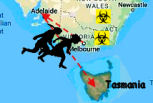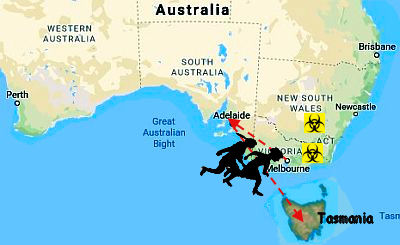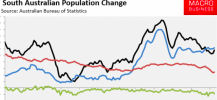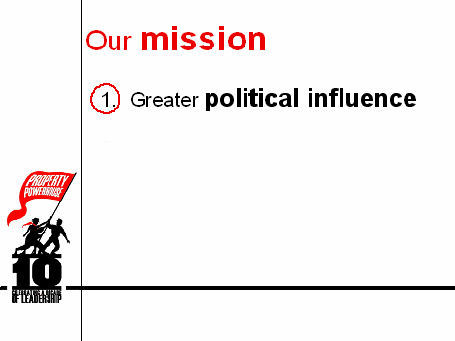Letter to Caroline Batty, Manager, Population Policy Unit, Department of Trade and Economic Development (DTED) in South Australia
Thursday 9th April, 2009
Dear Ms Batty,
In light of the following points:
(a) that over two-thirds of our overall water use is in food production, and
(b) the Murray-Darling Basin is receiving its lowest inflows in 117 years of record-keeping, and
(c) the irrigation water supply to most of the Food Bowl has collapsed, and
(d) Adelaide's proposed $1.3 billion desalination plant will provide part of the water needed for households but only a tiny fraction of the water that would be needed for food production; and
(e) continuing predictions from the top climate scientists in the country and the world that droughts are likely to get worse; and
(f) the recent rises in fertiliser costs to farmers; and
(g) the widely-accepted fact that crude oil production has reach a "ceiling" worldwide and is likely to decline in the coming years due to lack of investment,
I am very interested to know how the Population Advisory Group intends to meet its stated goal to "support the achievement of South Australia’s Strategic Plan targets to grow the South Australian population"?
Does the Group intend to come clean with the State Government and the public about the fact that our country is set to soon become a net food importer if we continue to increase our population? Does the Group intend to come clean with the public about the fact that, as well as absolute reductions in fuel and energy use (due to declining oil production and increasingly strict emissions targets), there will need to be a steep and ongoing reduction in per-capita consumption in order to "make room" (both metaphorically and literally) for all of the additional people?
Of course, there are food choices that could greatly reduce our land- and water-footprint, enabling us to accommodate more people. For instance, countries like Bangladesh manage to keep their population very high and their footprint very low through a highly successful culture of abject poverty. Does the Group have a similar vision for South Australia? Has the South Australian population been consulted to find out if they desire a lifestyle and diet similar to that of a typical Bangladeshi?
Below is a recent letter to my local MP and councillors on these issues. I expect it (and this) to be the first of many such letters.
Yours sincerely,
Dr James Ward
Ph.D., B.Eng.(Civil) (Hons), B.App.Sc.(Env. Mgt)
Postdoctoral Research Fellow
School of Chemistry, Physics & Earth Sciences
Flinders University
Letter to member of Parliament about democratic and other concerns re population policy in South Australia
TO:
The Hon. Mark Goldsworthy MP, Member for Kavel
CC:
The Hon. Isobel Redmond MP, Member for Heysen
The Hon. Jamie Briggs MP, Member for Mayo
Mayor Ann Ferguson, DC Mt Barker
Cr Lindsay Campbell, DC Mt Barker
Cr Jason Kuchel, DC Mt Barker
Cr Kathy Brazher-Delaine, DC Mt Barker
Cr Lyn Stokes, DC Mt Barker
5th April, 2009
Dear Mr Goldsworthy,
I am writing to express my gratitude for your taking the issue of population growth to Parliament [See also at end of this article], and to add my voice of disgust at the current Labor government's deliberate assault on Mount Barker, Nairne and Littlehampton (as well as other areas targeted for unnecessary growth).
My wife and I moved into the old township of Nairne in mid-2007. As first-home buyers, in part we were forced to move here by unaffordable house prices elsewhere, but the truth is that we both cherish the country lifestyle - we have some chickens, ducks, vegetables and fruit trees, happy relationships with neighbours and the local shopkeepers who know us by name. However, in the State Government's relentless pursuit of population growth, they apparently wish to abolish all desirable
aspects of this country lifestyle, in favour of short-term economic rewards (read: profits to property developers). To quote the State Treasurer, Kevin Foley, "the population is rising, and that's a damn good outcome." As with most people, I violently disagree.
Very scary numbers (like 400,000) are already being touted for this area. If that nightmare came true, we might as well all be living in one big, filthy city covering the whole of the Hills, with no culture of place whatsoever. As the Member representing citizens from this happy and attractive part of the world, I ask that you fight this proposed development with all of your power. I understand that your party may also have been pro-development in the past, but let us not forget the
Liberals' true heritage as a conservative party. If there ever was a time when we needed conservative thinkers, it is now in the face of the reigning Government's reckless push for a population explosion.
Of course, as conservative thinking people we must bear in mind that it is impossible for the proposed experiment in population growth to be successful. Like a population of bacteria on a Petri dish, the human population cannot increase forever. I direct you to the Ronald Wright's small book "A Short History of Progress"; the book contains numerous
sobering examples we would do well to learn from before embarking on this doomed quest for more growth. Another excellent book, only just released, is "Overloading Australia" by Mark O'Connor and Bill Lines, which provides the irrefutable case against further population growth in this country.
As you know, in the case of the modern industrialised global economy, we have now reached an upper limit to global oil production. The International Energy Agency has finally endorsed the reality of Peak Oil, predicting a global energy supply crunch. Right on cue, last year we witnessed the first collapse of some of America's "suburbia" - it doesn't take a genius to connect the dots: as fuel prices skyrocketed, the car-dependent suburban lifestyle became rapidly unsupportable, the
collapse of vulnerable mortgages ensued as people were no longer able to meet their financial obligations, and this generated what we now call the Global Financial Crisis. This is discouraging further investment in oil production, so it is fair to say we have begun the bumpy descent.
We would be well-advised to compare the example of the failed suburban experiment in America to the State Government's proposed experiment in endless growth in the Adelaide Hills. The magnitude of the proposed growth betrays a total disregard for the limitations on the world's fuel and energy supply that all intelligent and informed people now accept as real and extremely serious. As global fuel supplies contract further, the existing suburbs will be hit hard as they were in the US, let alone any proposed new car-dependent suburbs in semi-rural Adelaide Hills.
For brevity I will not go into water scarcity in detail (this tends to receive more media coverage in any case). Suffice to say that increasing the population increases the demand for domestic water supply, but more significantly it increases the demand for irrigated crops and pasture. Not only are we experiencing water restrictions at home, but the area under irrigated land is in decline due to limits to water abstractions in the Murray Darling Basin. To increase the population now would force
us onto tighter water restrictions in our homes (we've already said goodbye to green lawns, long showers, and children playing under sprinklers), but it would also generate higher food prices due to the water-scarce farming situation.
I must state that I am not opposed to development, as long as all future development is negotiated to be within certain very reasonable requirements. As a starting point, the bare minimum requirements are that all new developments must be:
- Commuter-independent, through a strong local job market (i.e. Mt Barker CBD), and - Car-independent through full provision of public transport and safe cycling facilities, and
- Energy-independent through suburb-scale renewable power generation, and
- Water-independent through stormwater and wastewater recycling, and
- Food-independent through local (including suburban) production, and
- Within prescribed, and unchangeable, limits such that biodiversity and aesthetics are maintained forever
These are completely reasonable obligations in the face of widely accepted global (and national) shortages in water, energy, fuel and food, and ongoing biodiversity loss. If property developers and governments are happy to work together to meet these obligations, then as a citizen I am happy for such developments to take place. However, if the vision they have for our future is one in which we are all crammed in like sardines with only the distant memory of what it was like to be able to afford fuel, or water-intensive products like beef and milk, and only a distant memory of such amenities as cars, fountains, swimming pools, air conditioners or warm baths, then let us encourage them to move to India or China and ask the residents there if they are happy - please don't let the Rann Government force such conditions on us here. The people simply do not want the growth, and any effort to hide this fact is grossly undemocratic.
I trust that you will take this on board and continue campaigning for the abolition of the State Strategic Plan's population target. You are not alone!
Yours sincerely,
Dr James Ward
Ph.D., B.Eng.(Civil) (Hons), B.App.Sc.(Env. Mgt)
Postdoctoral Research Fellow
School of Chemistry, Physics & Earth Sciences
Flinders University

Here is the document where Mark Goldsworthy questions the rate of growth in South Australia from
WILL THE PLAN FOR GREATER ADELAIDE BE THAT GREAT FOR HILLS RESIDENTS? Email this page Back
Friday, January 09, 2009
Mark Goldsworthy MP, Member for Kavel, announced today that he will undertake extensive community consultation within the local community as a result of the Rann Labor Government’s plans to allow the urban sprawl to continue in the Hills as part of their Plan for Greater Adelaide.
Mr Goldsworthy said whilst the State Government would be conducting their own consultation, they have a poor track record as has been experienced recently with their Country Health Plan and the water resources issues for the Mount Lofty Ranges.
“The Rann Government claims they consult with the community, yet the community feel the Government makes the decision and then tells them what is to occur, all in the spin of consultation”, said Mr Goldsworthy.
Mr Goldsworthy will contact residents and businesses in Mount Barker, Nairne and Littlehampton to gather their comments about the proposed expansion of housing in the district. He wants to know what people think about increased population, increased traffic, and increased demand on already stretched services such as schools, health and police.
Mr Goldsworthy’s consultation will include those service providers, being schools, health, police and others.
Mr Goldsworthy said the comments he has already received are that the services are now at or near capacity and it doesn’t appear the Government is doing much to meet the current demand. If the Government hasn’t been able to address current community expectations, what commitments will they give to provide improved services and infrastructure in line with their plans to reach the 2 million population target in the State? To give an example, car parking at the new Park and Ride in Mt Barker was at capacity virtually from day one, with bus services also full to capacity. The second freeway interchange is continually ignored by the State Labor Government and there are other examples.
“Some people tell me that housing development in the Hills is at a point where we should consolidate our current position and that it is at the limit, with now being the time to stop and properly assess the situation.”
“I understand the concerns already put forward by academics and the SA Farmers’ Federation, for example, the continued growth of residential development into prime agricultural and horticultural land”, said Mr Goldsworthy.
“I support economic development and sustainable growth, in a manner that is not detrimental to other important factors that impact on our community such as social and environmental effects. Some of my concerns are the fast rate in which the Rann Government is acting to expand the housing development, the impact on infrastructure and services, the loss of agriculture to the Hills, and the destruction of the Hills environment.”
“I undertake to ensure the local community is properly consulted about what they want to take place in their area. My community survey will go out in the coming two months to residents in Mt Barker, Nairne and Littlehampton who are most affected by the developments, however, anyone is welcome to contact me at any time to inform me of their views”, Mr Goldsworthy said.
“I intend to compare the results of my consultation with that of the Government’s, to hold them to account and to ensure that the wishes of the local community are heard loud and clear” Mark Goldsworthy said.
CONTACT INFORMATION:
Address: 20 Main Street, Lobethal SA 5241
Email: kavel[AT]parliament.sa.gov.au
Web: www.markgoldsworthy.com.au
 Jeff Dorset’s searing critique below targets the ABC’s mythic framing of Australia’s worst oceanic algal bloom, as seen in Daniel Keane, Leah MacLennan, and Che Chorley’s article, “Australia’s southern coast is in uncharted waters” (ABC, 1 Oct 2025).
Jeff Dorset’s searing critique below targets the ABC’s mythic framing of Australia’s worst oceanic algal bloom, as seen in Daniel Keane, Leah MacLennan, and Che Chorley’s article, “Australia’s southern coast is in uncharted waters” (ABC, 1 Oct 2025).
 "To date, I understand that 2,268 jurisdictions in 39 countries have declared a climate emergency. It is the one issue about which there is widespread global consensus. It presents a common threat to all countries and no country can isolate itself from it. However, to effectively tackle climate change, there must be an equal focus on population growth and the disastrous effect it is having on the earth's natural environment. To date, there is little evidence of governments doing that.
"To date, I understand that 2,268 jurisdictions in 39 countries have declared a climate emergency. It is the one issue about which there is widespread global consensus. It presents a common threat to all countries and no country can isolate itself from it. However, to effectively tackle climate change, there must be an equal focus on population growth and the disastrous effect it is having on the earth's natural environment. To date, there is little evidence of governments doing that. All Labor and Liberal members voted down this simple but inspiring and compassionate motion. It was like watching people walk past a person trying to help someone bleeding on the road after a traffic accident, saying that maybe the bleeding had gone on 'long enough' but it wasn't up to them to help.
All Labor and Liberal members voted down this simple but inspiring and compassionate motion. It was like watching people walk past a person trying to help someone bleeding on the road after a traffic accident, saying that maybe the bleeding had gone on 'long enough' but it wasn't up to them to help. Title was South Australia's Parliament to debate Julian Assange's plight this coming Wednesday - Why won't Canberra? Update, Sun 6 Nov 2022: Parliament will be sitting Monday, Tuesday, Wednesday and Thursday this coming week.
Title was South Australia's Parliament to debate Julian Assange's plight this coming Wednesday - Why won't Canberra? Update, Sun 6 Nov 2022: Parliament will be sitting Monday, Tuesday, Wednesday and Thursday this coming week. 12pm Wednesday 27 September Frank Pangallo MLC will put a
12pm Wednesday 27 September Frank Pangallo MLC will put a  The girls needed a break. The university term had just finished and so had "lock-down". Students, Isla and her two housemates, Chloe and Emily, were anxious to escape Melbourne. Emily's friend Olivia who was studying at Adelaide University had been trying, for more than a year, to entice Emily over for a visit, and this seemed the opportunity. Of course all three girls would go over together and, as they all yearned for a seaside experience, after spending so much time in their rented inner suburban house, they booked into an apartment for five nights in Glenelg, not far from Emily. It would be great! They could go for walks along the beach every morning!
The girls needed a break. The university term had just finished and so had "lock-down". Students, Isla and her two housemates, Chloe and Emily, were anxious to escape Melbourne. Emily's friend Olivia who was studying at Adelaide University had been trying, for more than a year, to entice Emily over for a visit, and this seemed the opportunity. Of course all three girls would go over together and, as they all yearned for a seaside experience, after spending so much time in their rented inner suburban house, they booked into an apartment for five nights in Glenelg, not far from Emily. It would be great! They could go for walks along the beach every morning!

 South Australian authorities have allegedly approved the slaughter of 200 ‘pest’ wombats by a Yorke Peninsula farmer, sending shock waves right across the community.
South Australian authorities have allegedly approved the slaughter of 200 ‘pest’ wombats by a Yorke Peninsula farmer, sending shock waves right across the community. Apex marine predators choose whom they hang with, researchers reveal. White sharks form communities, researchers have revealed. Although normally solitary predators, white sharks (Carcharodon carcharias) gather in large numbers at certain times of year in order to feast on baby seals.
Apex marine predators choose whom they hang with, researchers reveal. White sharks form communities, researchers have revealed. Although normally solitary predators, white sharks (Carcharodon carcharias) gather in large numbers at certain times of year in order to feast on baby seals.
 The South Australian Liberal Government is preparing the ground for a cheap labour flood by axing labour hire laws targeting migrant worker exploitation. The question of whether or not South Australian’s actually want this people flood is far more problematic. Back in October last year, the lobby group representing migration agents warned that South Australia’s population growth could fall to zero, and economic problems would worsen, following visa reforms by the federal government. Thankfully, this false alarm was ridiculed by former South Australian Premier, Jay Weatherill, who rejected the Migration Institute’s special pleadings. Article by Leith van Onselen, first published at
The South Australian Liberal Government is preparing the ground for a cheap labour flood by axing labour hire laws targeting migrant worker exploitation. The question of whether or not South Australian’s actually want this people flood is far more problematic. Back in October last year, the lobby group representing migration agents warned that South Australia’s population growth could fall to zero, and economic problems would worsen, following visa reforms by the federal government. Thankfully, this false alarm was ridiculed by former South Australian Premier, Jay Weatherill, who rejected the Migration Institute’s special pleadings. Article by Leith van Onselen, first published at 




 A hairy-nosed wombat community at Portee Station where this rare and persecuted animal is being rehabilitated and protected.
A hairy-nosed wombat community at Portee Station where this rare and persecuted animal is being rehabilitated and protected.

 UPDATE September 21, 2010: Millionaire bequest due in 12 months - but money urgently needed now.
UPDATE September 21, 2010: Millionaire bequest due in 12 months - but money urgently needed now.
 The Property Council of Australia's "Sustainable Urban Growth Conference" was the scene of lively protest for the first time as demonstrators against unsustainable population growth and infrastructure expansion handed out leaflets about peak oil and population to incoming conference participants. See also the second part of:
The Property Council of Australia's "Sustainable Urban Growth Conference" was the scene of lively protest for the first time as demonstrators against unsustainable population growth and infrastructure expansion handed out leaflets about peak oil and population to incoming conference participants. See also the second part of:  From a Property Council powerpoint presentation slide
From a Property Council powerpoint presentation slide
Recent comments